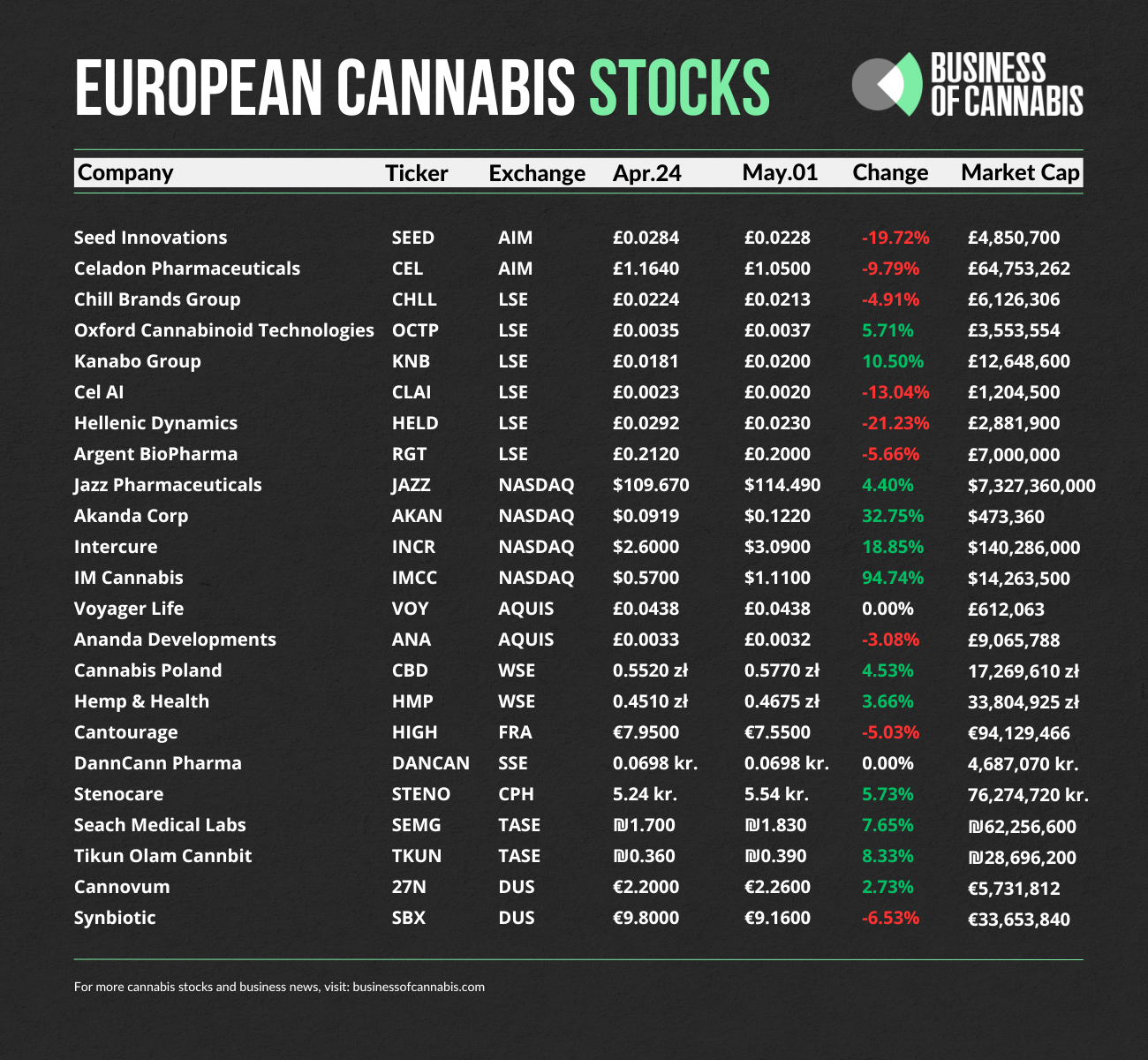North American cannabis stocks fly on DEA decision
On Tuesday (April 30), news broke via a leak to the press that the US Drug Enforcement Administration (DEA) is set to approve the rescheduling of cannabis, a move expected to have a significant impact on the cannabis industry across the globe.
Eight months after the Department of Health and Human Services (HHS) recommended rescheduling cannabis to the DEA on August 29, 2023, the organisation has reportedly made its decision, following sustained pressure from the Biden administration.
Catch up on the latest cannabis rescheduling news here.
The long-awaited news had an immediate positive impact on cannabis stock prices across US, Canadian and some European cannabis companies.
New Cannabis Ventures’ American Cannabis Operator Index, which tracks the stock prices of the 12 largest cultivators, processors, and retailers of cannabis in the country, jumped to peaks of over 25% yesterday, before falling back by around 10% yesterday.
Aurora Cannabis Inc, NASDAQ: ACB
Canadian cannabis stocks saw similar increases, also spiking by over 27% before levelling back out and dropping around 10% yesterday.
It was a similar story last August when news broke that the HHS first recommended cannabis be rescheduled, and while prices have fallen sharply in the last eight months, they have now returned to those peaks. How permanent these gains will be is yet to be seen.
For US companies, the boost in sentiment is largely down to the prospect of considerably lower tax burdens when cannabis is reclassified as a Schedule III substance, which could yet take months.
Frederico Gomes, Director of Institutional Research in Life Sciences at ATB Capital Markets, said he believes rescheduling is currently ‘not priced in’.
“The names in our coverage are trading at an average: 2024e EV/EBITDA of 9.3x, a 21.3% discount to our base-case sector valuation multiple of 11.8x, which does not consider catalysts such as re-scheduling or Florida legalisation.
“As a valuation exercise, using a 15x multiple on expected 280E savings in 2024e from re-scheduling, names in our coverage could see an average equity appreciation of 63.4%, with multiples expanding to 14.6x.”
Canopy Growth Corp, NASDAQ: CGC
Meanwhile, Canadian companies like Canopy Growth, Tilray and SNDL, which haven’t yet entered the US directly, have been quietly preparing for this opportunity to do so.
Speaking to the Wall Street Journal in January, Tilray’s CEO Simon Irwin suggested the company planned to enter the US market ‘pretty quickly’ when cannabis was rescheduled.
Last month, Canopy created Canopy USA, a US domiciled company that can ‘now move quickly to acquire its US assets in Wana, Jetty, and Acreage.’
Kanabo
In Europe, medical cannabis and telehealth operator Kanabo saw its stock increase by over 10% following the publication of its latest annual results.
In the year ended December 31, 2023, Kanabo reported revenues of £895k, up nearly 50% from £603k year-on-year.
This included £828k of revenues from The GP Service, the telehealth service Kanabo purchased in 2022, which also reported a net loss of £1.16m during the year.
“As a Group, we are executing against our strategic plan, leveraging our pharmacy network to expand the reach of our digital health services, and expanding our medicinal cannabis product portfolio,” the company said.
It’s ‘secondary care’ operations, which cover the development and distribution of cannabis-derived medicinal and wellness products, also reported revenues of £67k.
While gross profits came in at £134k, the company reported an overall loss for the year of £7.7m ‘as a result of impairment of intangible assets and goodwill in the amount of £4.4m’.
Impairment of intangible assets and goodwill refers to the process of recognising a decrease in the value of these assets on a company’s balance sheet. Intangible assets include items such as patents, copyrights, trademarks, and goodwill, which represent the value of a company’s brand, reputation, customer relationships, and other non-physical assets.
The year also saw Kanabo raise a further £2.74m through both ‘new and existing investors’, and recoup £82k following legal action against Materia, a partner that fell into receivership in March 2023.
Looking ahead, the company says that the ‘formulation and launch of medical cannabis products remain a bedrock’, and it is currently awaiting CE approval for its VapePod MD medicinal inhaler device.
Once secured, Kanabo plans to launch the product in the booming German medical cannabis market, and is reportedly already in the process of finalising definitive distribution agreements.
Furthermore, as Business of Cannabis reported last month, the company plans to expand its reach in the UK via physical pharmacies, and has already expanded its secondary care operations to include mental health.
Apollon Formularies
Apollon has announced plans to cease trading on the Aquis Stock Exchange, with its last day of trading expected to be June 02, 2024.
In September 2023, Business of Cannabis reported that Apollon had entered into another agreement to sell its ‘global assets’ after announcing that its previous deal with Global Hemp Group (GHG) had fallen through.
Apollon signed a binding letter of intent with Sproutly, which would see it acquire Apollon’s assets in exchange for ‘a sufficient number of Sproutly shares so that Apollon will own 49% of the enlarged share capital’ post transaction.
In an update in November, the pair said they had now completed the ‘due diligence of key assets of the companies’, setting the stage for the ‘finalisation of the asset purchase transaction’.
Under the proposed terms of the LOI, Sproutly will acquire the assets of Apollon pursuant to an asset purchase agreement.
As such, the company says it ‘can no longer support the high cost of being a quoted company while this process is concluding’.
Apollon says that there will be no alternative exchange platform to trade the company’s shares once the withdrawal has taken place, but that it will ‘explore potential mechanisms for the ongoing sale and purchase of its ordinary shares using platforms tailored to unlisted companies’.

























